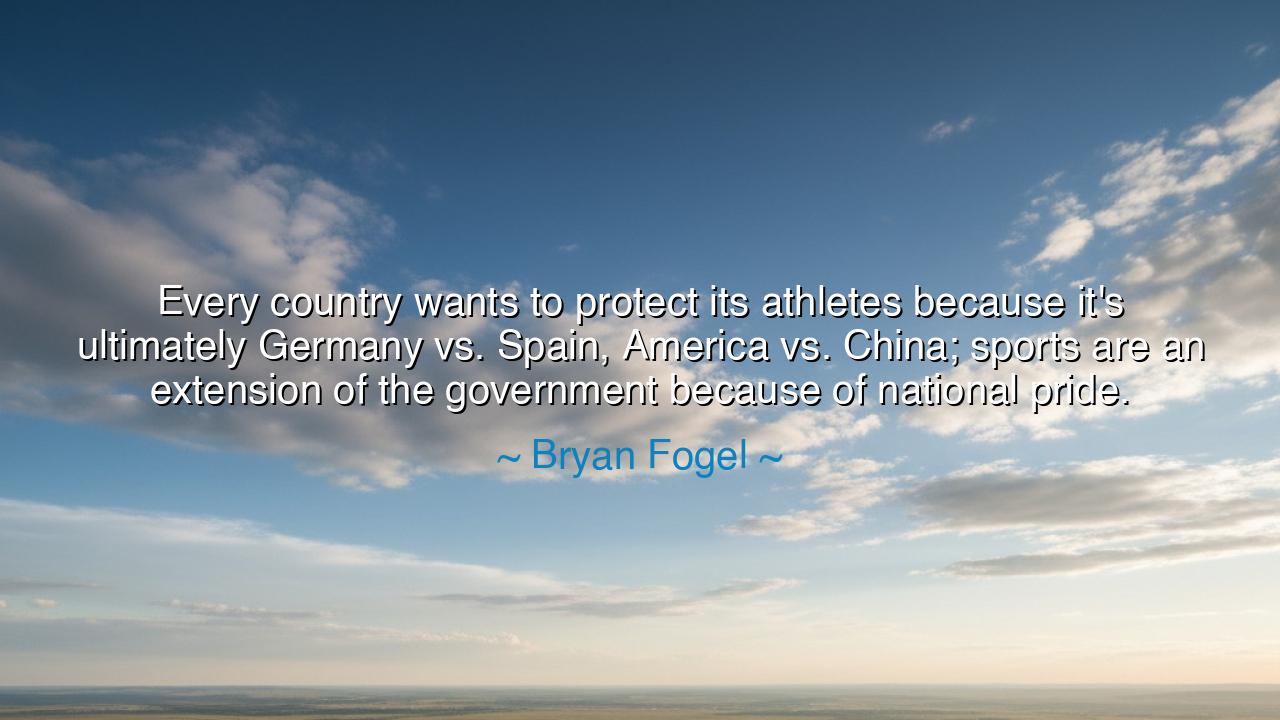
Every country wants to protect its athletes because it's
Every country wants to protect its athletes because it's ultimately Germany vs. Spain, America vs. China; sports are an extension of the government because of national pride.






The words of Bryan Fogel pierce with clarity: “Every country wants to protect its athletes because it’s ultimately Germany vs. Spain, America vs. China; sports are an extension of the government because of national pride.” In this, he unveils a truth often hidden behind the glamour of competition: that sport is not only about the individual athlete or the game itself, but about the soul of nations, about pride, power, and the banners under which men and women compete.
He begins with the desire of every country to protect its athletes. Why? Because the athlete, though one person, becomes the vessel of millions. When they run, the people run with them. When they fall, a nation mourns. And when they triumph, their victory belongs not to themselves alone but to the land that raised them. Thus, governments take upon themselves the mantle of guardianship, not only to nurture talent but to defend the honor of the flag.
Fogel reveals that in truth, sports are an extension of the government. This may seem strange, for sport is play, and government is power. Yet look deeper: in the arena, nations test not only skill but strength, discipline, and order. The Games become a bloodless battlefield, where rivalry unfolds without armies, but the outcome is felt as keenly as war. The roar of the crowd, the raising of the flag, the notes of the anthem—these are acts of sovereignty displayed through sweat and speed.
History thunders with this lesson. In 1936, the Berlin Olympics, Adolf Hitler sought to display Aryan supremacy before the world. Yet it was Jesse Owens, an African American, who shattered that illusion with four gold medals, proving both his own brilliance and the emptiness of Nazi ideology. Owens’s triumph was not just personal; it was a blow against tyranny, a symbol of freedom’s strength. Here we see Fogel’s truth: that the contest of nations is waged in the deeds of athletes.
So too in the Cold War, where the United States and the Soviet Union battled not only in politics and arms, but on ice rinks and tracks. The “Miracle on Ice” in 1980, when a team of young American amateurs defeated the mighty Soviet hockey machine, was more than a game—it was a surge of national pride, a moment when a people felt their spirit vindicated against a formidable rival. These contests were living proof that sport is inseparable from the honor of nations.
The lesson is not only about pride, but also about responsibility. If athletes carry the weight of nations, then nations must also care for their athletes—not exploit them, not discard them, but protect and uplift them. The medals shine not just for governments, but for the people who see in them their own reflection. And if athletes become symbols of national greatness, then the people must remember they are also human beings, worthy of dignity beyond the scoreboards.
Therefore, children of the future, take this wisdom: when you watch your country’s athlete, know that you watch more than a player—you watch the living flame of your people’s hope. When you compete, know that you carry not only your body, but the soul of your land. And when you lead, remember that to nurture athletes is to nurture the pride and unity of the nation itself.
Thus, Bryan Fogel’s words endure as a timeless teaching: sports are not merely games, but mirrors of nations, banners of pride, and instruments of power. Guard your athletes well, for through them your country’s honor is revealed to the world. And may the contests of sport teach us always to strive not only for victory, but for dignity, respect, and the greatness of the human spirit.






AAdministratorAdministrator
Welcome, honored guests. Please leave a comment, we will respond soon